Unit 5 Do you want to watch a game show? 单元导学课件95张PPT
文档属性
| 名称 | Unit 5 Do you want to watch a game show? 单元导学课件95张PPT |
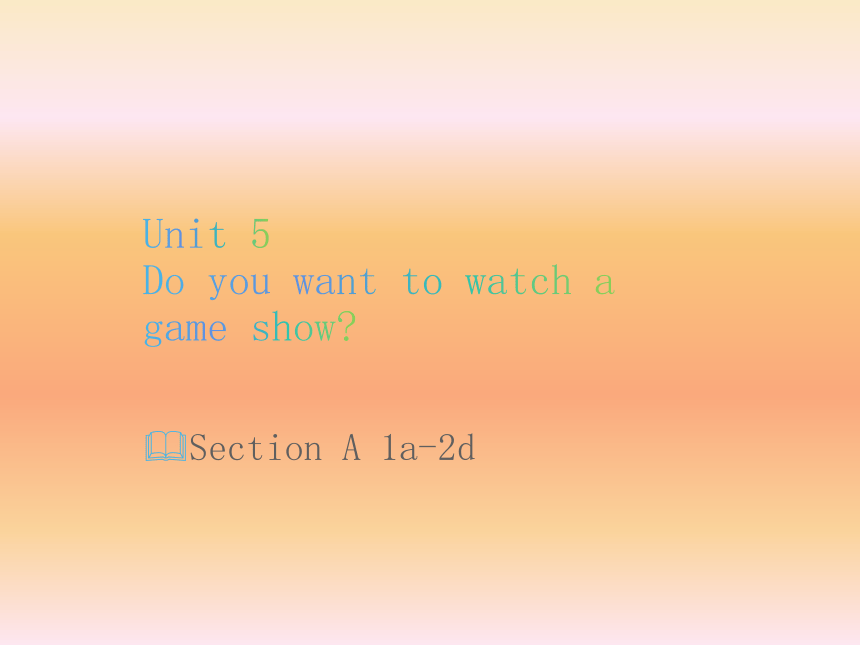
|
|
| 格式 | zip | ||
| 文件大小 | 2.1MB | ||
| 资源类型 | 教案 | ||
| 版本资源 | 人教新目标(Go for it)版 | ||
| 科目 | 英语 | ||
| 更新时间 | 2019-09-05 00:00:00 | ||
图片预览

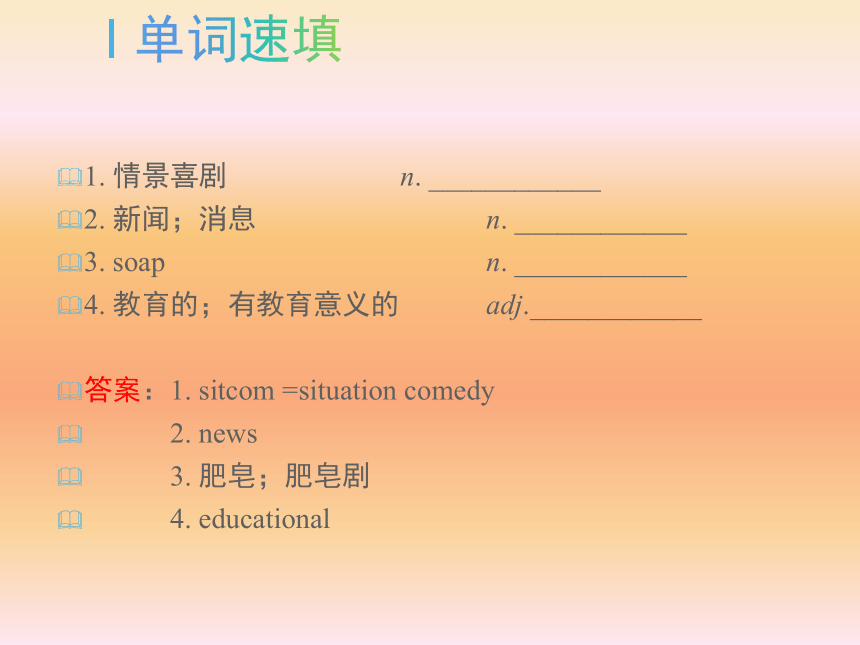
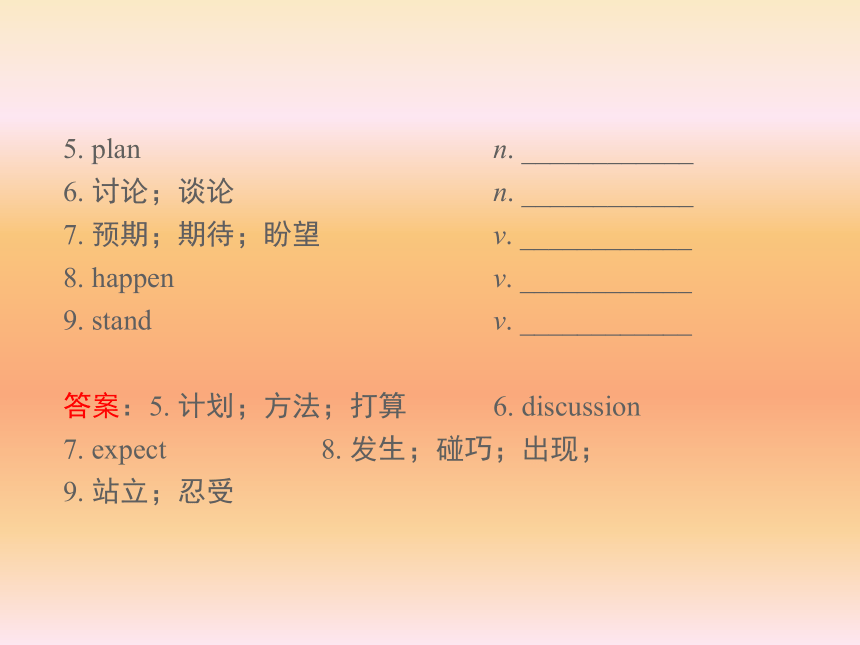
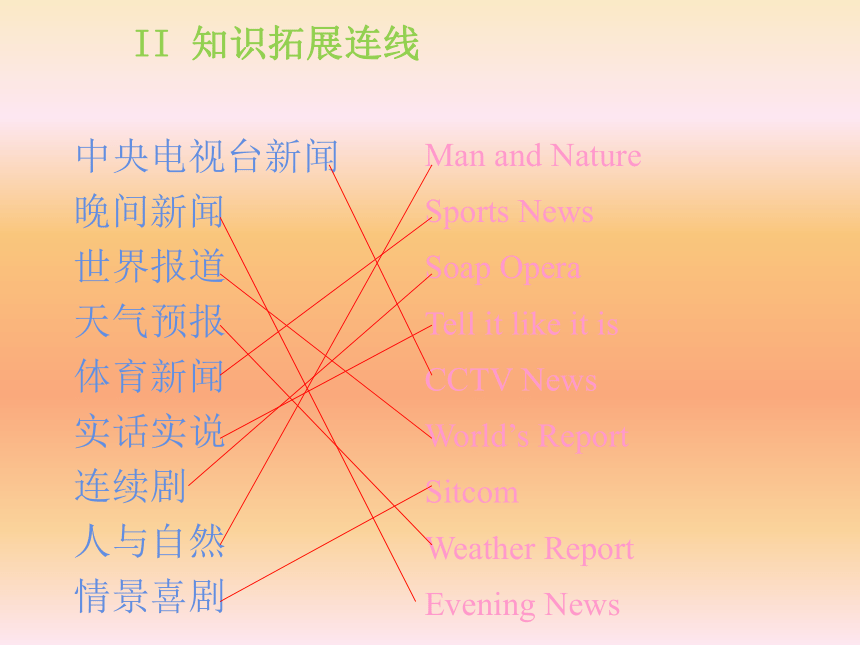
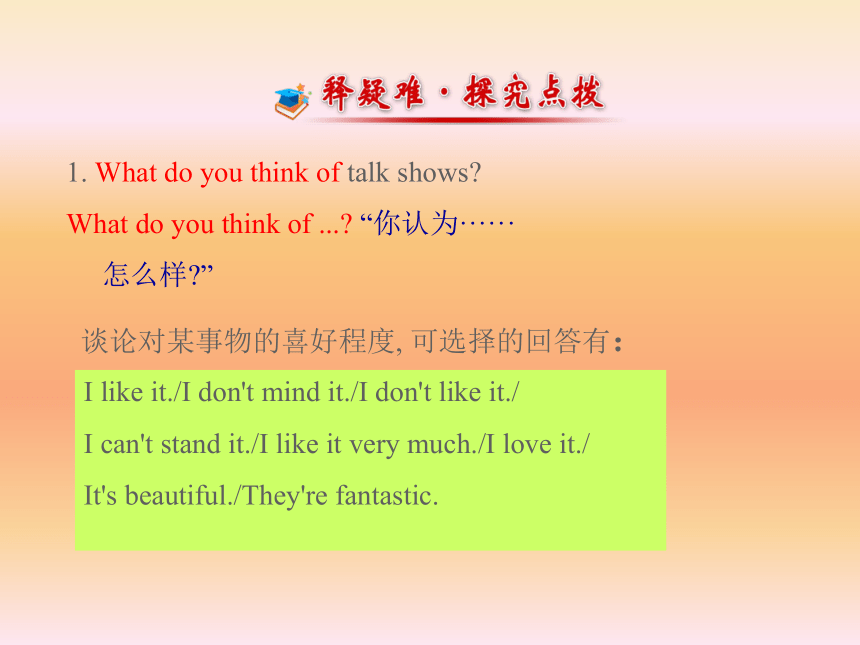

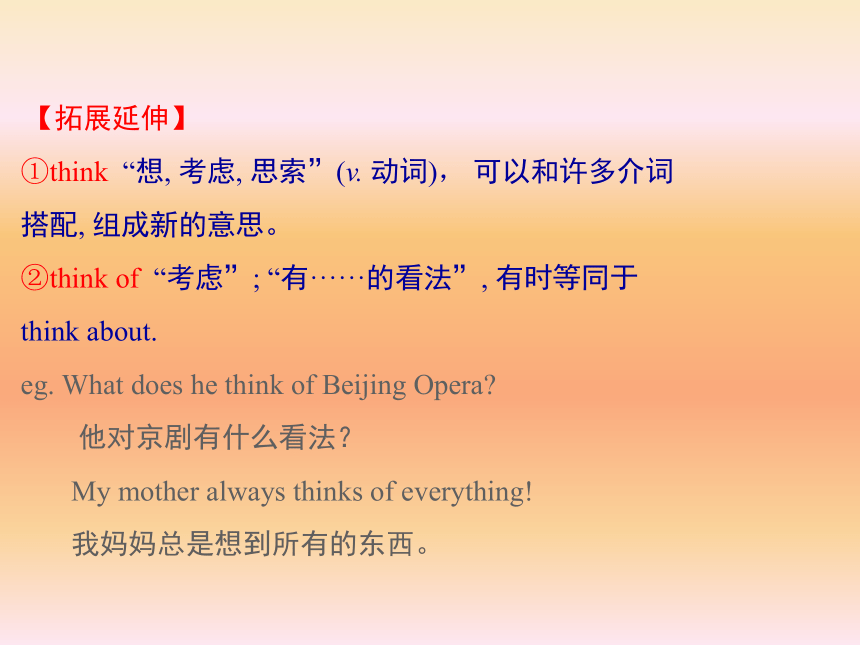
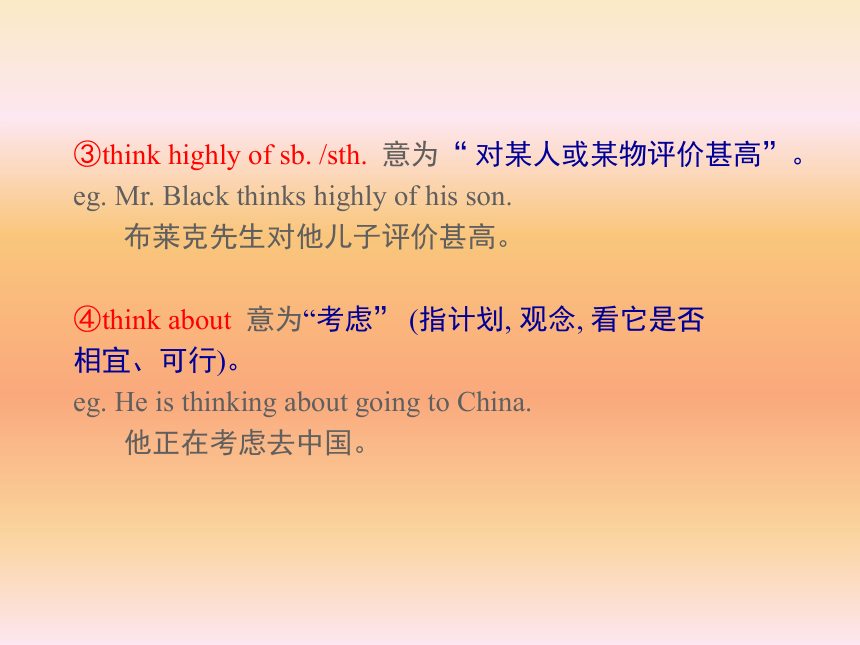
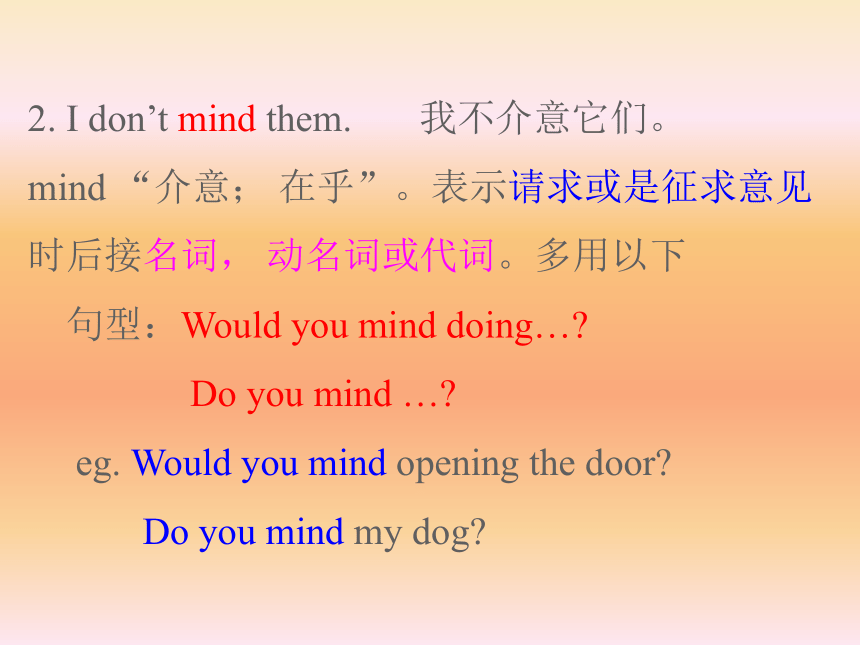
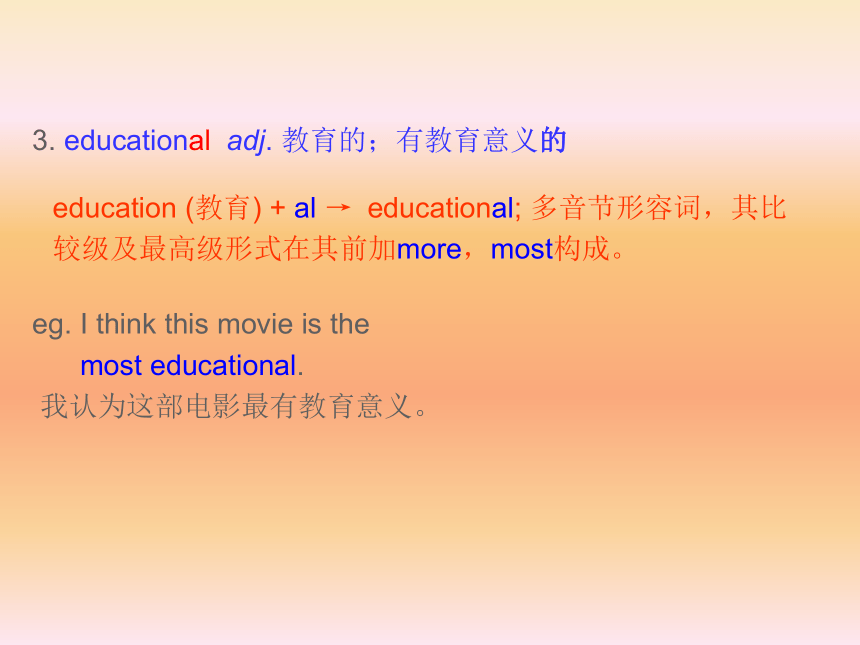
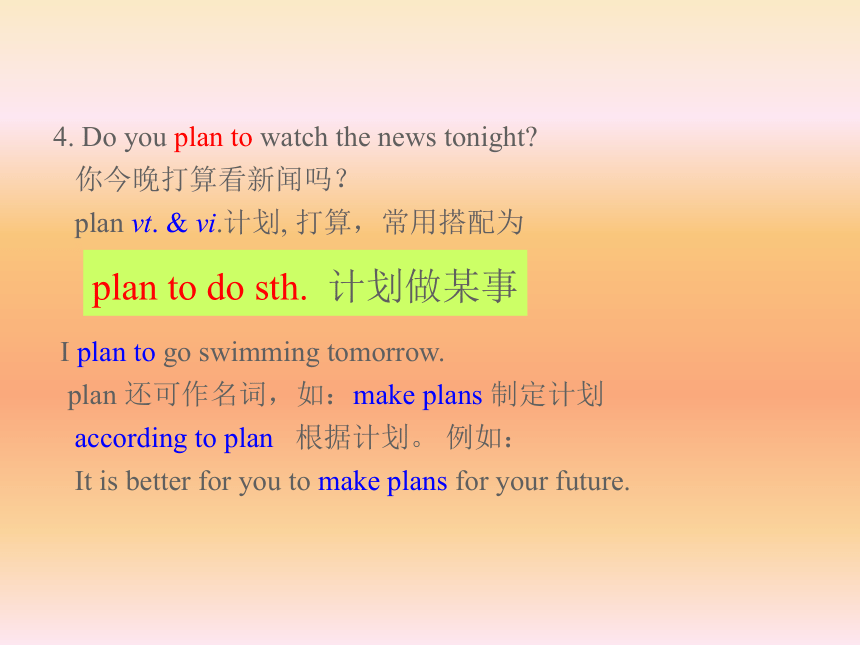

文档简介
课件95张PPT。Unit 5
Do you want to watch a game show?Section A 1a-2dI 单词速填1. 情景喜剧 n. ____________
2. 新闻;消息 n. ____________
3. soap n. ____________
4. 教育的;有教育意义的 adj.____________
答案:1. sitcom =situation comedy
2. news
3. 肥皂;肥皂剧
4. educational
5. plan n. ____________
6. 讨论;谈论 n. ____________
7. 预期;期待;盼望 v. ____________
8. happen v. ____________
9. stand v. ____________
答案:5. 计划;方法;打算 6. discussion
7. expect 8. 发生;碰巧;出现;
9. 站立;忍受中央电视台新闻
晚间新闻
世界报道
天气预报
体育新闻
实话实说
连续剧
人与自然
情景喜剧Man and Nature
Sports News
Soap Opera
Tell it like it is
CCTV News
World’s Report
Sitcom
Weather Report
Evening News
II 知识拓展连线1. What do you think of talk shows?
What do you think of ...? “你认为······
怎么样?”
谈论对某事物的喜好程度, 可选择的回答有:I like it./I don't mind it./I don't like it./
I can't stand it./I like it very much./I love it./
It's beautiful./They're fantastic.
【学以致用】
—____ do you think of the movie? — It’s very interesting. I like it.
A. Why B. Which
C. How D. What
此题考察句型What do you think of...?
故答案为D。 【拓展延伸】
①think “想, 考虑, 思索”(v. 动词), 可以和许多介词
搭配, 组成新的意思。
②think of “考虑”; “有······的看法”, 有时等同于
think about.
eg. What does he think of Beijing Opera?
他对京剧有什么看法?
My mother always thinks of everything!
我妈妈总是想到所有的东西。
③think highly of sb. /sth. 意为“ 对某人或某物评价甚高”。
eg. Mr. Black thinks highly of his son.
布莱克先生对他儿子评价甚高。
④think about 意为“考虑” (指计划, 观念, 看它是否
相宜、可行)。
eg. He is thinking about going to China.
他正在考虑去中国。2. I don’t mind them. 我不介意它们。
mind “介意; 在乎”。表示请求或是征求意见时后接名词, 动名词或代词。多用以下
句型:Would you mind doing…?
Do you mind …?
eg. Would you mind opening the door?
Do you mind my dog?3. educational adj. 教育的;有教育意义的education (教育) + al → educational; 多音节形容词,其比较级及最高级形式在其前加more,most构成。eg. I think this movie is the
most educational.
我认为这部电影最有教育意义。4. Do you plan to watch the news tonight?
你今晚打算看新闻吗?
plan vt. & vi.计划, 打算,常用搭配为
I plan to go swimming tomorrow.
plan 还可作名词,如:make plans 制定计划
according to plan 根据计划。 例如:
It is better for you to make plans for your future.
plan to do sth. 计划做某事4. hope v. & n. 希望eg. Don’t lose your hope!
不要灰心!hope to do sth. 希望做某事 (能实现的理想)eg. They hope to take the
plane to Beijing next year.
他们希望来年乘飞机去北京。5. find out 查明; 弄清 (指通过调查、研究
等方式查明事情的真相)eg. Did they find out where the old man lived?
他们查明那位老人住在哪里了吗?辨析: find 意为“找到;发现”,强调动作的结果。eg. Mr. Li found his lost keys in the library.
李老师在图书馆里找到了他丢失的钥匙。6. discussion n. 讨论; 商量动词 discuss (讨论) + ion→ discussioneg. Let’s discuss who is the best performer. 让我们讨论一下谁是最好的表演者。Did you have a discussion about the food and drinks?
他们讨论过食物和饮料的事了吗? 7. I can’t stand them! 我不能忍受它们!
stand 1)“站, 站立” eg. Stand up! 起立
2) 忍受 (多用于否定句、疑问句)
常与 can’t 连用。Stand 后接名词、代词、
动名词
eg. I can’t stand the movie! It is too boring!
Mary couldn't stand the hot weather.
Can you stand the pain?
I can’t stand waiting any longer.
【学以致用】
It’s too hot in the classroom. We can’t ___ it.
We all ___ up and go out of the classroom.
A. mind; stand B. stand; stand
C. sit; stand此题考察的是stand的两个词义。句意是“教室里太热了。我们不能忍受。我们都站起来走出了教室”。故答案为B。8. may model v. 也许; 可以; 可能eg. You may go by bike or take the subway.
你们可以骑自行车去或乘地铁去。“may + 动词原形”一起构成句子的谓语。 9. expect v. 预料; 期待expect to do sth. 期盼做某事 eg. Jack expects to visit his grandparents this weekend. 杰克期望周末去看望他的祖父母。1. ——你们今天班上做什么了?
——我们进行了一次有关电视剧的讨论。—What ____ you ______ in class today, Sarah?
—We _____ ____ ________ ______TV shows.did do had a discussion aboutI like to _____ _____ _______and see
_______ ________ next.2. 我喜欢跟着电视剧走,看看下面发生了什么事。follow the storywhat happens测测你They _____ _____ _____very exciting, but
you can expect ____ _____a lot _____ them.
I hope ____ ______a TV reporter one day.3.他们可能不太刺激,但是我希望从中
学到很多东西,我希望有一天会成为一
个电视记者。may not beto learnfromto be I 单选题
1. A: What __ your brother think of the bike?
B: He likes it.
A. does B. do C. is D. are
2. A: What do they think ___ the movie?
B: They like it very much.
A. to B. of C. for D. about3. A: What do you think of sitcoms?
B: Oh, I _________ mind them.
A. can’t B. don’t C. am not D. didn't
4. A: What does she think of the scarf?
B: She ________ stand them.
A. isn’t B. doesn’t C. can’t D. aren't1. My grandfather likes wearing fashion clothes.
He ____________ what young people
________ (认为)him.
2. The old men ____________ rock music.
They think it’s too noisy.
3. Her sister _______ soap opera.
That’s her favorite.
4. I __________ to go shopping with Mother.
It’s crowded in the store.doesn’t mindthink ofcan’t standloves don’t likeII 填空题5. —What _____ you think of soap operas?
—I ______ stand ______.
6. —What _____ your classmates think of sports shows?
—They _____ mind ______.
7.—What _____ she think of my new shirt?
— She _______ like _____.
8. —What ______ Tony think of the food?
—He likes _____.
9. —What _____ they think of the cat?
—They love _____.docan’tthemdodoesdoesn’titdoesitdoitdon’tthem1. 你想看新闻吗?
Do you want to ______ ___ _____?
2. 你觉得谈话节目怎么样?
What do you ______ ___ __________?
3. 我不介意看。/我不能忍受。/ 我喜欢看。
I don’t ______ them. I _____ ______ them. I ____ ________ them.
4. 你计划今晚上看什么节目?
_____ do you _____ ___ watch tonight?think of talk showswatch the newsmindcan’t standIII 根据课本内容,完成下列句子 love watchingplan toWhat 5. 我计划看《我们过去的时代》。
I ______ ____ watch Days of Our Past.
6. 你期望从情景喜剧中学到什么?
What can you ______ __ ______ from sitcoms?
7. 你能学到一些很好的笑话。
You can ______ some great _____.
8. 你为什么喜欢看新闻呢?
Why do you like _________ ___ ______?
9. 因为我希望了解在世界各地发生了什么事情。
Because I _____ ___ _____ ____ what’s going on around the world. plan toexpect to learnlearn jokeswatching the newshope to find out1. 你觉得肥皂剧怎么样? 我受不了。
________ do you ______ ___ _____ ______?
I ______ ________ _______.
2. 他不喜欢情景喜剧。
He _______ _____ _______.
3. Tina对运动节目不在乎。
Tina _______ ______ ______ ______.Whatthink of soap operascan’t stand them doesn’t like sitcomsdoesn’t mind sports showsIV 中译英4. Tony认为谈话节目怎么样? 他很喜爱它。
—What ______Tony think of _____ _____?
— He ________ it.
5. 我哥哥喜欢体育世界而我姐姐喜欢情景喜剧。
My brother ______ Sports World _______ my
sister likes ________.doestalk showloveslikeswhilesitcom6. 你认为这条裙怎么样? 我无法忍受它的颜色。
7. 你妈妈喜欢访谈节目吗?
非常喜欢, 因为她认为它们很有趣。—What do you think of this skirt?
—I can’t stand its color.—Does your mother like talk shows?
—Yes, she does. She thinks they’re interesting.1. She loves soap operas. (变成一般疑问句, 并作
否定回答)
2. Sally went to bed early last night. (变成否定句)
3. Dick doesn‘t mind talk show. (变成 what 引导
的问句)
—Does she love soap operas?
—No, she doesn’t. Sally didn’t go to bed early last night .What does Dick think of talk show? V 句型转换4. Rick's mother loves sitcoms. (变成否定句)
5. I wear colorful clothes because I want to be
young and beautiful. (就划线部分提问)Rick's mother doesn’t love sitcoms.Why do you wear colorful clothes?Unit 5 Do you want to watch a game show?Section A Grammar Focus-3c 1) like sb. / sth.
我喜欢我的朋友们。
汤姆非常喜欢数学。
凯特不喜欢西红柿。I like my friends.Tom likes math very much.Kate doesn’t like tomatoes.1. Why do you like watching the news?2)like doing sth.喜欢做……(经常性,习惯性)
我喜欢看电视。
你喜欢打篮球吗?
3) like to do sth. 喜欢做……(偶尔)
我不喜欢打篮球。
I like watching TV. Do you like playing basketball?I don’t like to play basketball .2. Because I hope to find out what's going on around the world.
此句中的“ find out” 用作及物动词短语,常表达找出答案,弄明真相,查明情况等意思。如:
Please find out when the train leaves.
请查一下火车什么时候离站。 表示“寻找,找出等近义词还有“ look for , find”
1)look for “寻找”指有目的地找。强调“寻找”
的过程。
e.g. What are you looking for?
你在找什么? (强调找的过程)
2) find vt. “找” 强调找的结果。
e.g. I looked for my book everywhere, but I
didn’t find it. (结果是没找到)
3. How about you? 你呢?
How about 后面除了接名词, 代词以外, 还
可以接动名词。
e.g. How about going for an outing?
去郊游怎么样?
How about playing soccer?
去踢足球怎么样?
How about that?
怎么样? (表示征求意见, 惊叹等)4. Do you want to watch a movie?
你想要看电影吗?
1) want vt. 意为“需要;想要”。
The boy wants to go to Taiyuan.
那个小男孩想去太原。
2)
I want a sweater. 我想要一件毛衣。
want + n. 想要······want to do sth. 想要做某事e.g. If you want to be respected, please learn to
respect others first.
如果你想别人尊重你,就请先尊重别人。
want sb. to do sth. 想让某人干某事I want her to go to a movie with me.
我想让她和我去看电影。 3) 4)1.英语中询问个人喜好时常用:Do you want to…?的句型。这是一个由助动词Do 引导的一般疑问句,其语序是:助动词do +主语+
其他成分?如:
—Do you want to watch a game show?
—Yes, I do.(肯定回答)或是
—No, I don’t (否定回答)语法聚焦A: Do you want to watch the news?
B: Yes, I do. / No, I don’t.A: Does he want to watch the news?
B: Yes, he does./ No, he doesn’t. A: Does she want to watch the news?
B: Yes, she does./ No, she doesn’t. 而要询问对方有什么打算时用:What do
you plan to do…? 这里的“ plan to do sth”
译为:打算/计划做某事。例如:
— What do you plan to watch tonight?
— I plan to watch Days of Our Past.A: What do you plan to watch tonight?
B: I plan to watch Mr. Bean.A: What does he plan to watch tonight?
B: He plans to watch sports show. A: What does she plan to watch tonight?
B: She plans to watch her favorite soap opera.2. What can you expect to learn from sitcoms?
你希望从情景剧中学到什么?
其中 expect to do sth. 希望/ 期望干某事。
learn from 后可以接人也可以接事物,构成
learn from sb. 向某人学习
learn from sth. 从某事中学习
e.g. —What can you expect to learn from sitcoms?
—I hope to learn some great jokes.
—What can you expect to learn from news report?
—I hope to learn what happened around the world.—What can you expect to learn from talent show?
—I hope to learn some simple skills.—What can you expect to learn from sports show?
—I hope to learn their sport spirits.A: Do you want to go to a movie?
B: Yes, I do. I want to see an ___________. action movieLook and sayA: ___ you _________
go to a movie?
B: Yes, I do. I _______
see a _________. Dowant towant tocomedyA: ___ you ________
_____________?
B: Yes, ____. I ______
see a ___________. go to a movie Dowant towant toI doscary movieI、根据汉语,补全英语句子。 1. “你觉得游戏节目怎样?”“我忍受不了那些东西。” “______do you________? _______game shows?”
“ I _______? _____them”. 2. 他们对每样东西的看法如何? ____ did they _____? _______everything? What think of can’t standWhat think of 3. 我们喜欢在课堂上用英语问问题。 We enjoy______? _______? ____ _______ in class. 4. 你介意把这件事告诉他好吗? Would you________? ________him about this?mind tellingasking questions with EnglishPractice5 他们不能忍受太阳镜。你呢?
They can’t _____ the sunglasses. ____________you?
6 Tina对运动节目不在乎。
Tina ______ _____ _______ _______.
7 Tony认为谈话节目怎么样?他很喜爱它。
What ______Tony think of _____ _____? He ______it.can’t stand sports showsdoestalk showloves II、句式转换。
1. I don't mind sports shows.(划线提问)
2.Tom loves Shunliu in My Brother Is Called
Shunliu.(同上)
3. I like game shows.(否定句)
4. His brother likes talk shows.(一般问句)What do you think of sports shows?Does his brother like talk shows?What does Tom think of Shunliu in My
Brother Is Called Shunliu. I don't like game shows.5. I like soap operas.(变成一般疑问句) 6. Does John like talk shows?(作否定回答)7. Liza likes sitcoms.( 对划线部分提问)Do you like soap operas?No, he doesn’t.What does Liza like?1. A: What do you think of sitcoms?
B: Oh, I _________ mind them.
A. can’t B. don’t C. am not D. won't
2. A: What does she think of the talk show?
B: She ________ stand them.
A. isn’t B. doesn’t C. can’t D. aren'tIII、选择题BC3. She wants to _________.
A. swim B. swimming C. swims D. swimedA4. — ____ do you think of the movie?
— It’s very interesting. I like it.
A. Why B. Which
C. How D. WhatD5. It’s too hot in the classroom. We can’t ___ it.
We all ___ up and go out of the classroom.
A. mind; stand B. stand; stand
C. sit; stand
6. How about _____ out for a walk?
A. to go B. going
C. go D. goes
BB7. A: What ____ your brother think of the bike?
B: He likes it.
A. does B. do C. is
8. A: What do they think ___ the movie.
B: They like it very much.
A. to B. of C. forABUnit 5 Do you want to watch a game show?Section B 1a-2e电影类型连线1. 动作片
2. 喜剧
3. 卡通片
4. 恐怖片
5. 科幻电影
cartoon
scary movie
science fiction
comedy
action movie6. 纪录片
7. 爱情片
8. 战争片
9. 京剧
romance
war movie
documentary
Beijing opera1. What is your favorite cartoon?
你最喜欢的卡通片是什么?
“ what’ s your favorite…? 是用来询问对方
最喜爱事物是什么。其同义句为“ what…
do you like best?
回答用: My favorite book is …或是 I like …best.
e.g. what’s your favorite book?
= what book do you like best?
My favorite book is Snow White.
或是 I like Snow White best.2. When people say “culture”, we think of
art and history. 当人们提起文化时,我们就 会想到艺术和历史。
think of 有考虑;想起;有…想法;对…有意见 等意思。在该句中应理解为“ 想起, 想到”。例如:
Does the poem make you think of spring?
这首诗有没有让你想到春天?
How many stars can you think of?
你能想到多少明星?
3. When this cartoon came out in New York on
November 18, 1928, it was the first cartoon
with sound and music.
当这部动画片于1928 年11月18 问世于纽约
时,它成为第一部带有音乐的动画片。
“ come out” 在本句中译为“ 出版” 引申为
“ 问世”。此外还有:出来,(花)开出来之意。
e.g. The book comes out this week.
该书本周上市。
4. One of the main reasons is that Mickey was like a common man, but he always tried to face any danger.一个主要原因是米奇看似一个普通人,但他总是尝试应对任何危险。
one of …后跟可数名词复数,表示…之一。
其后的谓语动词用单数。
e.g. One of my favorite movies is Mr. Bean.
我最喜欢的电影之一是憨豆先生。
One of my best friends is Ann.
安是我最好的朋友之一。5. However, he was always ready to try his best.
然而,他总是做好尽全力的准备。
1) be ready to do sth 准备做某事
get ready to do sth 与之同义,但前者强
调状态,后者强调动作。
e.g. Are you ready to start? 你准备好了吗?
Please get ready to start.
请作好开始的准备。2) Try one’s best 尽某人最大的努力
其后跟动词不定式形式,即: try one’s best to do sth.
e.g. Don't give up. Just try your best.
不要放弃。只管尽你最大的努力。
Come on!Just try your best to let your
dream come true.
加油!尽最大的努力去实现你的梦想吧。
6. People went to the cinema to see the “little
man” win.
人们去电影院是为了看这个“ 小人儿” 赢。
go to the cinema 也可译为“ 看电影”类似
表达如下:
go to movies
go to a movie
go to see a movie.
a movie
an action movie
Go to a comedy
a documentary
a thriller
a movie
an action movie
a comedy
a documentary
a thriller
=see【拓展延伸】 8. Today’s cartoons are usually not so simple
as little Mickey Mouse.
现在的卡通片通常不像米老鼠那样简单。
此句中not so… as 结构表示“ 不像……那
样……; 不如……这么……”。又如:
It wasn’t so good as last time.
这次不如上次好。
It is not so easy as you’d think.
这不像你想的那样简单。一. 翻译
1. 你喜欢什么样的电影? 喜剧。
What ____ of ________ do you like?
I like comedies.
2. 他不喜欢京剧, 因为京剧太没意思了。
He ______ like Beijing Opera,
because ___ is very _______. kindmovies doesn’t boringitPractice3. 他是我最喜欢的演员, 我认为他很出色。
He is my _______ actor. I ______ he
is ______.
4. 她认为喜剧很有趣, 所以经常和朋友
去看喜剧。
She ________ comedies are very
______, so she _____ ______ to see
comedies ______ her friends.favoritethinkgreatthinksfunnyoftengoeswith二.单项选择?
1. What?do?you?________?do??
?? A. want????????B. want?to??????C. like??????????D. to?like??
2. My?grandfather?________?stay?________?home?
and?watch?TV.???
A. like,?at?????? B. like,?in????
? C. likes?to,?at???? ?D. likes?to,?in??
3.________?kind?of?movies?________?Lucy?like??
?? A.What,?does?? B.What,?do??????
C.What’s,?does?? ?D.Which,?do??
BCA?? 4.________?a?word,?we?can?learn?a?lot?
________?Chinese?history.??
? A.For,?for????? B.In,?about??
??? C.For,?about????? D.In,?for??
5. Gina?likes?action?movies,?________?she?doesn’t?
like?thrillers.?
?? A.and???????? B.so???????????
C.or??????????? ?D.but??
6. September is ________ month of the year.
A.nineth B.ninth
C.the nineth D.the ninth BDDUnit 5 Do you want to watch a game show?Section A 3a-Self Check短语速填
1.去看电影 _____________
2.动作片 _____________
3.京剧 ______________
4.看…… _____________
5.大量,许多____________
6.因为____________go to a movieaction moviesBeijing Operalook ata lot of because of 7.事实上 ____________
8.找到 ____________
9.想起 ____________
10.替代……的位置 ___________
11.干得好 ______________
12.尽最大努力 _____________in factfind outthink oftake one's placedo a good jobtry one’s best 1. She dresses up like a boy and takes her
father’s place to fight in the army.
她女扮男装,替父上战场打仗。
1) dress up “盛装打扮、乔装打扮”。 ???????
? e.g. I’d?like?you?to?dress?up?for?my?birthday
? party tonight.??
今晚我希望你为我的生日派对打扮打扮。????????
Young?kids?often?dress?up?and?have?fun?
at?Halloween.??万圣节前夜,小孩子通常都
乔装打扮,玩得很开心。2)take one’s place “取代某人的位置,顶替。”
e.g. Nam believes that no one can take
Kin's place in her heart.
家岚相信,在她的内心世界里没有人可
以取代陆坚。
2. They did a good job in the movie.
他们在电影中表演出色。
do a good job 好好干;干得好; 干得出色
e.g. I'm sure you can do a better job next time.
我相信你下次会干得更好。
You've done a good job of it.
你干得太漂亮了!常见的跟动词不定式做宾语的动词:想要 ______ 期望 ______ 希望 _______ 计划 ______ 决定 ______ 开始 _______ 开始 ______ 尽力 ______ 要求________动词不定式的形式:to + 动词原形 e.g. Jack wants to buy some flowers for Mr Wu. 杰克想给吴老师买些花。 wantexpecthopeplandecidebeginstarttry动词不定式做宾语的用法ask【拓展】省略to的不定式有些动词后面跟动词不定式时, 应将不定式符号to省去。常见的动词有 let, make, feel, help, watch, hear 等。e.g. 让我来帮助你。
Let me help you. 你能帮助我打扫房间吗?
Can you help me clean the house?【拓展】后面跟doing的动词常见的动词有enjoy, finish, practice, mind
keep等。你喜欢看电视吗?
Do you enjoy watching TV. 你完成作业了吗?
Did you finish doing your homework.【拓展】后面跟doing/ to do 都可以的动词常见的动词有like, love, start, begin等。你喜欢看电视吗?
Do you like watching/ to watch TV. 【助记】
不定式有标记,to与动词连一起;
没有人称、数变化,动词特点它具备;
主宾定表及状语,唯独谓语不可以;
not加上不定式,否定结构要牢记;
疑问词与不定式,构成短语有意义;
仔细推敲多考虑,准确判断有依据。
1. She expects ____________ (arrive) tomorrow.
2. Let’s _________ (watch) talk shows tonight.
3. They hope __________ (visit) the Great Wall next year.
4. Do you plan __________ (find) a part-time job?
5. When do you want ________ (go) swimming?
6. My uncle often helps me ________ (learn) English. to findto goto visitwatchlearn【学以致用】to arrive一、单项选择1. — Do you want to go to a movie?
— _________
A. Yes, I want. B. No, I am not.
C. Yes, I do. D. No, I haven’t
2. Jack wants _______ the park (公园).
A. go to B. to go
C. to go to D. goes to
3. My brother likes action movies ______
he doesn’t like documentaries.
A. and B. but C. or D. soCCBPractice 4. Which one is right? _____
A. I like action movies and like comedies.
B. I like action movie and comedies.
C. I like action movies and comedy.
D. I like action movies and comedies.
5. On weekends, I often go to movies
_____ my friends.
A. for B. with C. at D. ofDB6. Bob and his sister _____ volleyball.
A. are B. likes C. like D. plays
7. Let’s look at pictures _____ Beijing
Opera.
A. for B. of C. in D. at
8. Jack often _____ seven classes
every day.
A. have B. do C. has D. doesCBC9. Ken Johnson is _______ great actor, and
Shaolin Temple is _______ action movie.
A. an; an B. an; a C. a; an D. a; a
10. — _____ kind of movies do you like?
— Action movies.
A. What B. Who C. How D. When
11. — _______ is your favorite film?
— Mr. Bean.
A. What B. When C. Where D. HowCAA 二、根据要求完成句子。
1. Sally’s birthday is October fifth.
(对划线提问)
________ _____ Sally’s birthday?
2. Peter’s sister likes thrillers.
(一般疑问句)
______ Peter’s sister ______ thrillers?
3. We have an Art Festival each year.
(否定句)
We _______ _______ an Art Festival
each year.When isDoes likedon’t have4. Mary wants to see a movie.
(对划线提问)
What _______ Mary _______ to see?
5. Grandmother wants a birthday
party this year. (否定句)
Grandmother ________ ______ a
birthday party this year.
6. I want to have apples and eggs for
dinner. (一般问句)
_____ _____ _____ to have apples
and eggs for dinner?doeswantdoesn’t wantDo you want 7. The students want to see an action
movie. (提问)
_____ ____ ____ _______ ________ to see?
8. My sister wants some color pencils.
(提问) _____ _____ ____ _____ _________?
9. I like Beijing opera. My mother doesn’t like
Beijing opera.
(用恰当的词连接句子)
I like Beijing opera, ____ my mother
doesn’t like it.What do the students wantWhat does your sister wantbut三、句式转换
1.Tom loves Shunliu in My Brother Is Called
Shunliu.(对画线提问)
What does Tom think of Shunliu in
My Brother Is Called Shunliu?
2. I like game shows.(否定句)
I don't like game shows.
3. His brother likes talk shows.(一般疑问句)
Does his brother like talk shows?Unit 5 Do you want to watch a game show?
【导语】往昔已逝,静如止水;我们无法再作改变。而前方的未来正生机勃勃;我们所做的每一件事都将会影响着它。
We're Just Beginning
"We are reading the first verse of the first chapter of a book whose pages are infinite..."
I do not know who wrote those words, but I have always liked them as a reminder that the future can be anything we want to make it. We can take the mysterious, hazy future and carve out of it anything that we can imagine, just as a sculptor carves a statue from a shapeless stone.
We are all in the position of the farmer. If we plant a good seed, we reap a good harvest. If our seed is poor and full of weeds, we reap a useless crop. If we plant nothing at all, we harvest nothing at all. I want the future to be better than the past. I don’t want it contaminated by the mistakes and errors with which history is filled. We should all be concerned about the future because that is where we will spend the remainder of our lives.
The past is gone and static. Nothing we can do will change it. The future is before us and dynamic. Everything we do will affect it. Each day brings with it new frontiers, in our homes and in our business, if we only recognize them. We are just at the beginning of the progress in every field of human endeavor.
【词海拾贝】
infinite 无限的,无穷的;无数的;极大的
reminder 暗示;提醒的人/物;催单
hazy 朦胧的;模糊的;有薄雾的
carve out 创业;开拓;雕刻
shapeless 不成形的;不定形的;不象样的
contaminate 污染,弄脏
static 静态的;静电的;静力的
Thank you
2. 新闻;消息 n. ____________
3. soap n. ____________
4. 教育的;有教育意义的 adj.____________
答案:1. sitcom =situation comedy
2. news
3. 肥皂;肥皂剧
4. educational
5. plan n. ____________
6. 讨论;谈论 n. ____________
7. 预期;期待;盼望 v. ____________
8. happen v. ____________
9. stand v. ____________
答案:5. 计划;方法;打算 6. discussion
7. expect 8. 发生;碰巧;出现;
9. 站立;忍受中央电视台新闻
晚间新闻
世界报道
天气预报
体育新闻
实话实说
连续剧
人与自然
情景喜剧Man and Nature
Sports News
Soap Opera
Tell it like it is
CCTV News
World’s Report
Sitcom
Weather Report
Evening News
II 知识拓展连线1. What do you think of talk shows?
What do you think of ...? “你认为······
怎么样?”
谈论对某事物的喜好程度, 可选择的回答有:I like it./I don't mind it./I don't like it./
I can't stand it./I like it very much./I love it./
It's beautiful./They're fantastic.
【学以致用】
—____ do you think of the movie? — It’s very interesting. I like it.
A. Why B. Which
C. How D. What
此题考察句型What do you think of...?
故答案为D。 【拓展延伸】
①think “想, 考虑, 思索”(v. 动词), 可以和许多介词
搭配, 组成新的意思。
②think of “考虑”; “有······的看法”, 有时等同于
think about.
eg. What does he think of Beijing Opera?
他对京剧有什么看法?
My mother always thinks of everything!
我妈妈总是想到所有的东西。
③think highly of sb. /sth. 意为“ 对某人或某物评价甚高”。
eg. Mr. Black thinks highly of his son.
布莱克先生对他儿子评价甚高。
④think about 意为“考虑” (指计划, 观念, 看它是否
相宜、可行)。
eg. He is thinking about going to China.
他正在考虑去中国。2. I don’t mind them. 我不介意它们。
mind “介意; 在乎”。表示请求或是征求意见时后接名词, 动名词或代词。多用以下
句型:Would you mind doing…?
Do you mind …?
eg. Would you mind opening the door?
Do you mind my dog?3. educational adj. 教育的;有教育意义的education (教育) + al → educational; 多音节形容词,其比较级及最高级形式在其前加more,most构成。eg. I think this movie is the
most educational.
我认为这部电影最有教育意义。4. Do you plan to watch the news tonight?
你今晚打算看新闻吗?
plan vt. & vi.计划, 打算,常用搭配为
I plan to go swimming tomorrow.
plan 还可作名词,如:make plans 制定计划
according to plan 根据计划。 例如:
It is better for you to make plans for your future.
plan to do sth. 计划做某事4. hope v. & n. 希望eg. Don’t lose your hope!
不要灰心!hope to do sth. 希望做某事 (能实现的理想)eg. They hope to take the
plane to Beijing next year.
他们希望来年乘飞机去北京。5. find out 查明; 弄清 (指通过调查、研究
等方式查明事情的真相)eg. Did they find out where the old man lived?
他们查明那位老人住在哪里了吗?辨析: find 意为“找到;发现”,强调动作的结果。eg. Mr. Li found his lost keys in the library.
李老师在图书馆里找到了他丢失的钥匙。6. discussion n. 讨论; 商量动词 discuss (讨论) + ion→ discussioneg. Let’s discuss who is the best performer. 让我们讨论一下谁是最好的表演者。Did you have a discussion about the food and drinks?
他们讨论过食物和饮料的事了吗? 7. I can’t stand them! 我不能忍受它们!
stand 1)“站, 站立” eg. Stand up! 起立
2) 忍受 (多用于否定句、疑问句)
常与 can’t 连用。Stand 后接名词、代词、
动名词
eg. I can’t stand the movie! It is too boring!
Mary couldn't stand the hot weather.
Can you stand the pain?
I can’t stand waiting any longer.
【学以致用】
It’s too hot in the classroom. We can’t ___ it.
We all ___ up and go out of the classroom.
A. mind; stand B. stand; stand
C. sit; stand此题考察的是stand的两个词义。句意是“教室里太热了。我们不能忍受。我们都站起来走出了教室”。故答案为B。8. may model v. 也许; 可以; 可能eg. You may go by bike or take the subway.
你们可以骑自行车去或乘地铁去。“may + 动词原形”一起构成句子的谓语。 9. expect v. 预料; 期待expect to do sth. 期盼做某事 eg. Jack expects to visit his grandparents this weekend. 杰克期望周末去看望他的祖父母。1. ——你们今天班上做什么了?
——我们进行了一次有关电视剧的讨论。—What ____ you ______ in class today, Sarah?
—We _____ ____ ________ ______TV shows.did do had a discussion aboutI like to _____ _____ _______and see
_______ ________ next.2. 我喜欢跟着电视剧走,看看下面发生了什么事。follow the storywhat happens测测你They _____ _____ _____very exciting, but
you can expect ____ _____a lot _____ them.
I hope ____ ______a TV reporter one day.3.他们可能不太刺激,但是我希望从中
学到很多东西,我希望有一天会成为一
个电视记者。may not beto learnfromto be I 单选题
1. A: What __ your brother think of the bike?
B: He likes it.
A. does B. do C. is D. are
2. A: What do they think ___ the movie?
B: They like it very much.
A. to B. of C. for D. about3. A: What do you think of sitcoms?
B: Oh, I _________ mind them.
A. can’t B. don’t C. am not D. didn't
4. A: What does she think of the scarf?
B: She ________ stand them.
A. isn’t B. doesn’t C. can’t D. aren't1. My grandfather likes wearing fashion clothes.
He ____________ what young people
________ (认为)him.
2. The old men ____________ rock music.
They think it’s too noisy.
3. Her sister _______ soap opera.
That’s her favorite.
4. I __________ to go shopping with Mother.
It’s crowded in the store.doesn’t mindthink ofcan’t standloves don’t likeII 填空题5. —What _____ you think of soap operas?
—I ______ stand ______.
6. —What _____ your classmates think of sports shows?
—They _____ mind ______.
7.—What _____ she think of my new shirt?
— She _______ like _____.
8. —What ______ Tony think of the food?
—He likes _____.
9. —What _____ they think of the cat?
—They love _____.docan’tthemdodoesdoesn’titdoesitdoitdon’tthem1. 你想看新闻吗?
Do you want to ______ ___ _____?
2. 你觉得谈话节目怎么样?
What do you ______ ___ __________?
3. 我不介意看。/我不能忍受。/ 我喜欢看。
I don’t ______ them. I _____ ______ them. I ____ ________ them.
4. 你计划今晚上看什么节目?
_____ do you _____ ___ watch tonight?think of talk showswatch the newsmindcan’t standIII 根据课本内容,完成下列句子 love watchingplan toWhat 5. 我计划看《我们过去的时代》。
I ______ ____ watch Days of Our Past.
6. 你期望从情景喜剧中学到什么?
What can you ______ __ ______ from sitcoms?
7. 你能学到一些很好的笑话。
You can ______ some great _____.
8. 你为什么喜欢看新闻呢?
Why do you like _________ ___ ______?
9. 因为我希望了解在世界各地发生了什么事情。
Because I _____ ___ _____ ____ what’s going on around the world. plan toexpect to learnlearn jokeswatching the newshope to find out1. 你觉得肥皂剧怎么样? 我受不了。
________ do you ______ ___ _____ ______?
I ______ ________ _______.
2. 他不喜欢情景喜剧。
He _______ _____ _______.
3. Tina对运动节目不在乎。
Tina _______ ______ ______ ______.Whatthink of soap operascan’t stand them doesn’t like sitcomsdoesn’t mind sports showsIV 中译英4. Tony认为谈话节目怎么样? 他很喜爱它。
—What ______Tony think of _____ _____?
— He ________ it.
5. 我哥哥喜欢体育世界而我姐姐喜欢情景喜剧。
My brother ______ Sports World _______ my
sister likes ________.doestalk showloveslikeswhilesitcom6. 你认为这条裙怎么样? 我无法忍受它的颜色。
7. 你妈妈喜欢访谈节目吗?
非常喜欢, 因为她认为它们很有趣。—What do you think of this skirt?
—I can’t stand its color.—Does your mother like talk shows?
—Yes, she does. She thinks they’re interesting.1. She loves soap operas. (变成一般疑问句, 并作
否定回答)
2. Sally went to bed early last night. (变成否定句)
3. Dick doesn‘t mind talk show. (变成 what 引导
的问句)
—Does she love soap operas?
—No, she doesn’t. Sally didn’t go to bed early last night .What does Dick think of talk show? V 句型转换4. Rick's mother loves sitcoms. (变成否定句)
5. I wear colorful clothes because I want to be
young and beautiful. (就划线部分提问)Rick's mother doesn’t love sitcoms.Why do you wear colorful clothes?Unit 5 Do you want to watch a game show?Section A Grammar Focus-3c 1) like sb. / sth.
我喜欢我的朋友们。
汤姆非常喜欢数学。
凯特不喜欢西红柿。I like my friends.Tom likes math very much.Kate doesn’t like tomatoes.1. Why do you like watching the news?2)like doing sth.喜欢做……(经常性,习惯性)
我喜欢看电视。
你喜欢打篮球吗?
3) like to do sth. 喜欢做……(偶尔)
我不喜欢打篮球。
I like watching TV. Do you like playing basketball?I don’t like to play basketball .2. Because I hope to find out what's going on around the world.
此句中的“ find out” 用作及物动词短语,常表达找出答案,弄明真相,查明情况等意思。如:
Please find out when the train leaves.
请查一下火车什么时候离站。 表示“寻找,找出等近义词还有“ look for , find”
1)look for “寻找”指有目的地找。强调“寻找”
的过程。
e.g. What are you looking for?
你在找什么? (强调找的过程)
2) find vt. “找” 强调找的结果。
e.g. I looked for my book everywhere, but I
didn’t find it. (结果是没找到)
3. How about you? 你呢?
How about 后面除了接名词, 代词以外, 还
可以接动名词。
e.g. How about going for an outing?
去郊游怎么样?
How about playing soccer?
去踢足球怎么样?
How about that?
怎么样? (表示征求意见, 惊叹等)4. Do you want to watch a movie?
你想要看电影吗?
1) want vt. 意为“需要;想要”。
The boy wants to go to Taiyuan.
那个小男孩想去太原。
2)
I want a sweater. 我想要一件毛衣。
want + n. 想要······want to do sth. 想要做某事e.g. If you want to be respected, please learn to
respect others first.
如果你想别人尊重你,就请先尊重别人。
want sb. to do sth. 想让某人干某事I want her to go to a movie with me.
我想让她和我去看电影。 3) 4)1.英语中询问个人喜好时常用:Do you want to…?的句型。这是一个由助动词Do 引导的一般疑问句,其语序是:助动词do +主语+
其他成分?如:
—Do you want to watch a game show?
—Yes, I do.(肯定回答)或是
—No, I don’t (否定回答)语法聚焦A: Do you want to watch the news?
B: Yes, I do. / No, I don’t.A: Does he want to watch the news?
B: Yes, he does./ No, he doesn’t. A: Does she want to watch the news?
B: Yes, she does./ No, she doesn’t. 而要询问对方有什么打算时用:What do
you plan to do…? 这里的“ plan to do sth”
译为:打算/计划做某事。例如:
— What do you plan to watch tonight?
— I plan to watch Days of Our Past.A: What do you plan to watch tonight?
B: I plan to watch Mr. Bean.A: What does he plan to watch tonight?
B: He plans to watch sports show. A: What does she plan to watch tonight?
B: She plans to watch her favorite soap opera.2. What can you expect to learn from sitcoms?
你希望从情景剧中学到什么?
其中 expect to do sth. 希望/ 期望干某事。
learn from 后可以接人也可以接事物,构成
learn from sb. 向某人学习
learn from sth. 从某事中学习
e.g. —What can you expect to learn from sitcoms?
—I hope to learn some great jokes.
—What can you expect to learn from news report?
—I hope to learn what happened around the world.—What can you expect to learn from talent show?
—I hope to learn some simple skills.—What can you expect to learn from sports show?
—I hope to learn their sport spirits.A: Do you want to go to a movie?
B: Yes, I do. I want to see an ___________. action movieLook and sayA: ___ you _________
go to a movie?
B: Yes, I do. I _______
see a _________. Dowant towant tocomedyA: ___ you ________
_____________?
B: Yes, ____. I ______
see a ___________. go to a movie Dowant towant toI doscary movieI、根据汉语,补全英语句子。 1. “你觉得游戏节目怎样?”“我忍受不了那些东西。” “______do you________? _______game shows?”
“ I _______? _____them”. 2. 他们对每样东西的看法如何? ____ did they _____? _______everything? What think of can’t standWhat think of 3. 我们喜欢在课堂上用英语问问题。 We enjoy______? _______? ____ _______ in class. 4. 你介意把这件事告诉他好吗? Would you________? ________him about this?mind tellingasking questions with EnglishPractice5 他们不能忍受太阳镜。你呢?
They can’t _____ the sunglasses. ____________you?
6 Tina对运动节目不在乎。
Tina ______ _____ _______ _______.
7 Tony认为谈话节目怎么样?他很喜爱它。
What ______Tony think of _____ _____? He ______it.can’t stand sports showsdoestalk showloves II、句式转换。
1. I don't mind sports shows.(划线提问)
2.Tom loves Shunliu in My Brother Is Called
Shunliu.(同上)
3. I like game shows.(否定句)
4. His brother likes talk shows.(一般问句)What do you think of sports shows?Does his brother like talk shows?What does Tom think of Shunliu in My
Brother Is Called Shunliu. I don't like game shows.5. I like soap operas.(变成一般疑问句) 6. Does John like talk shows?(作否定回答)7. Liza likes sitcoms.( 对划线部分提问)Do you like soap operas?No, he doesn’t.What does Liza like?1. A: What do you think of sitcoms?
B: Oh, I _________ mind them.
A. can’t B. don’t C. am not D. won't
2. A: What does she think of the talk show?
B: She ________ stand them.
A. isn’t B. doesn’t C. can’t D. aren'tIII、选择题BC3. She wants to _________.
A. swim B. swimming C. swims D. swimedA4. — ____ do you think of the movie?
— It’s very interesting. I like it.
A. Why B. Which
C. How D. WhatD5. It’s too hot in the classroom. We can’t ___ it.
We all ___ up and go out of the classroom.
A. mind; stand B. stand; stand
C. sit; stand
6. How about _____ out for a walk?
A. to go B. going
C. go D. goes
BB7. A: What ____ your brother think of the bike?
B: He likes it.
A. does B. do C. is
8. A: What do they think ___ the movie.
B: They like it very much.
A. to B. of C. forABUnit 5 Do you want to watch a game show?Section B 1a-2e电影类型连线1. 动作片
2. 喜剧
3. 卡通片
4. 恐怖片
5. 科幻电影
cartoon
scary movie
science fiction
comedy
action movie6. 纪录片
7. 爱情片
8. 战争片
9. 京剧
romance
war movie
documentary
Beijing opera1. What is your favorite cartoon?
你最喜欢的卡通片是什么?
“ what’ s your favorite…? 是用来询问对方
最喜爱事物是什么。其同义句为“ what…
do you like best?
回答用: My favorite book is …或是 I like …best.
e.g. what’s your favorite book?
= what book do you like best?
My favorite book is Snow White.
或是 I like Snow White best.2. When people say “culture”, we think of
art and history. 当人们提起文化时,我们就 会想到艺术和历史。
think of 有考虑;想起;有…想法;对…有意见 等意思。在该句中应理解为“ 想起, 想到”。例如:
Does the poem make you think of spring?
这首诗有没有让你想到春天?
How many stars can you think of?
你能想到多少明星?
3. When this cartoon came out in New York on
November 18, 1928, it was the first cartoon
with sound and music.
当这部动画片于1928 年11月18 问世于纽约
时,它成为第一部带有音乐的动画片。
“ come out” 在本句中译为“ 出版” 引申为
“ 问世”。此外还有:出来,(花)开出来之意。
e.g. The book comes out this week.
该书本周上市。
4. One of the main reasons is that Mickey was like a common man, but he always tried to face any danger.一个主要原因是米奇看似一个普通人,但他总是尝试应对任何危险。
one of …后跟可数名词复数,表示…之一。
其后的谓语动词用单数。
e.g. One of my favorite movies is Mr. Bean.
我最喜欢的电影之一是憨豆先生。
One of my best friends is Ann.
安是我最好的朋友之一。5. However, he was always ready to try his best.
然而,他总是做好尽全力的准备。
1) be ready to do sth 准备做某事
get ready to do sth 与之同义,但前者强
调状态,后者强调动作。
e.g. Are you ready to start? 你准备好了吗?
Please get ready to start.
请作好开始的准备。2) Try one’s best 尽某人最大的努力
其后跟动词不定式形式,即: try one’s best to do sth.
e.g. Don't give up. Just try your best.
不要放弃。只管尽你最大的努力。
Come on!Just try your best to let your
dream come true.
加油!尽最大的努力去实现你的梦想吧。
6. People went to the cinema to see the “little
man” win.
人们去电影院是为了看这个“ 小人儿” 赢。
go to the cinema 也可译为“ 看电影”类似
表达如下:
go to movies
go to a movie
go to see a movie.
a movie
an action movie
Go to a comedy
a documentary
a thriller
a movie
an action movie
a comedy
a documentary
a thriller
=see【拓展延伸】 8. Today’s cartoons are usually not so simple
as little Mickey Mouse.
现在的卡通片通常不像米老鼠那样简单。
此句中not so… as 结构表示“ 不像……那
样……; 不如……这么……”。又如:
It wasn’t so good as last time.
这次不如上次好。
It is not so easy as you’d think.
这不像你想的那样简单。一. 翻译
1. 你喜欢什么样的电影? 喜剧。
What ____ of ________ do you like?
I like comedies.
2. 他不喜欢京剧, 因为京剧太没意思了。
He ______ like Beijing Opera,
because ___ is very _______. kindmovies doesn’t boringitPractice3. 他是我最喜欢的演员, 我认为他很出色。
He is my _______ actor. I ______ he
is ______.
4. 她认为喜剧很有趣, 所以经常和朋友
去看喜剧。
She ________ comedies are very
______, so she _____ ______ to see
comedies ______ her friends.favoritethinkgreatthinksfunnyoftengoeswith二.单项选择?
1. What?do?you?________?do??
?? A. want????????B. want?to??????C. like??????????D. to?like??
2. My?grandfather?________?stay?________?home?
and?watch?TV.???
A. like,?at?????? B. like,?in????
? C. likes?to,?at???? ?D. likes?to,?in??
3.________?kind?of?movies?________?Lucy?like??
?? A.What,?does?? B.What,?do??????
C.What’s,?does?? ?D.Which,?do??
BCA?? 4.________?a?word,?we?can?learn?a?lot?
________?Chinese?history.??
? A.For,?for????? B.In,?about??
??? C.For,?about????? D.In,?for??
5. Gina?likes?action?movies,?________?she?doesn’t?
like?thrillers.?
?? A.and???????? B.so???????????
C.or??????????? ?D.but??
6. September is ________ month of the year.
A.nineth B.ninth
C.the nineth D.the ninth BDDUnit 5 Do you want to watch a game show?Section A 3a-Self Check短语速填
1.去看电影 _____________
2.动作片 _____________
3.京剧 ______________
4.看…… _____________
5.大量,许多____________
6.因为____________go to a movieaction moviesBeijing Operalook ata lot of because of 7.事实上 ____________
8.找到 ____________
9.想起 ____________
10.替代……的位置 ___________
11.干得好 ______________
12.尽最大努力 _____________in factfind outthink oftake one's placedo a good jobtry one’s best 1. She dresses up like a boy and takes her
father’s place to fight in the army.
她女扮男装,替父上战场打仗。
1) dress up “盛装打扮、乔装打扮”。 ???????
? e.g. I’d?like?you?to?dress?up?for?my?birthday
? party tonight.??
今晚我希望你为我的生日派对打扮打扮。????????
Young?kids?often?dress?up?and?have?fun?
at?Halloween.??万圣节前夜,小孩子通常都
乔装打扮,玩得很开心。2)take one’s place “取代某人的位置,顶替。”
e.g. Nam believes that no one can take
Kin's place in her heart.
家岚相信,在她的内心世界里没有人可
以取代陆坚。
2. They did a good job in the movie.
他们在电影中表演出色。
do a good job 好好干;干得好; 干得出色
e.g. I'm sure you can do a better job next time.
我相信你下次会干得更好。
You've done a good job of it.
你干得太漂亮了!常见的跟动词不定式做宾语的动词:想要 ______ 期望 ______ 希望 _______ 计划 ______ 决定 ______ 开始 _______ 开始 ______ 尽力 ______ 要求________动词不定式的形式:to + 动词原形 e.g. Jack wants to buy some flowers for Mr Wu. 杰克想给吴老师买些花。 wantexpecthopeplandecidebeginstarttry动词不定式做宾语的用法ask【拓展】省略to的不定式有些动词后面跟动词不定式时, 应将不定式符号to省去。常见的动词有 let, make, feel, help, watch, hear 等。e.g. 让我来帮助你。
Let me help you. 你能帮助我打扫房间吗?
Can you help me clean the house?【拓展】后面跟doing的动词常见的动词有enjoy, finish, practice, mind
keep等。你喜欢看电视吗?
Do you enjoy watching TV. 你完成作业了吗?
Did you finish doing your homework.【拓展】后面跟doing/ to do 都可以的动词常见的动词有like, love, start, begin等。你喜欢看电视吗?
Do you like watching/ to watch TV. 【助记】
不定式有标记,to与动词连一起;
没有人称、数变化,动词特点它具备;
主宾定表及状语,唯独谓语不可以;
not加上不定式,否定结构要牢记;
疑问词与不定式,构成短语有意义;
仔细推敲多考虑,准确判断有依据。
1. She expects ____________ (arrive) tomorrow.
2. Let’s _________ (watch) talk shows tonight.
3. They hope __________ (visit) the Great Wall next year.
4. Do you plan __________ (find) a part-time job?
5. When do you want ________ (go) swimming?
6. My uncle often helps me ________ (learn) English. to findto goto visitwatchlearn【学以致用】to arrive一、单项选择1. — Do you want to go to a movie?
— _________
A. Yes, I want. B. No, I am not.
C. Yes, I do. D. No, I haven’t
2. Jack wants _______ the park (公园).
A. go to B. to go
C. to go to D. goes to
3. My brother likes action movies ______
he doesn’t like documentaries.
A. and B. but C. or D. soCCBPractice 4. Which one is right? _____
A. I like action movies and like comedies.
B. I like action movie and comedies.
C. I like action movies and comedy.
D. I like action movies and comedies.
5. On weekends, I often go to movies
_____ my friends.
A. for B. with C. at D. ofDB6. Bob and his sister _____ volleyball.
A. are B. likes C. like D. plays
7. Let’s look at pictures _____ Beijing
Opera.
A. for B. of C. in D. at
8. Jack often _____ seven classes
every day.
A. have B. do C. has D. doesCBC9. Ken Johnson is _______ great actor, and
Shaolin Temple is _______ action movie.
A. an; an B. an; a C. a; an D. a; a
10. — _____ kind of movies do you like?
— Action movies.
A. What B. Who C. How D. When
11. — _______ is your favorite film?
— Mr. Bean.
A. What B. When C. Where D. HowCAA 二、根据要求完成句子。
1. Sally’s birthday is October fifth.
(对划线提问)
________ _____ Sally’s birthday?
2. Peter’s sister likes thrillers.
(一般疑问句)
______ Peter’s sister ______ thrillers?
3. We have an Art Festival each year.
(否定句)
We _______ _______ an Art Festival
each year.When isDoes likedon’t have4. Mary wants to see a movie.
(对划线提问)
What _______ Mary _______ to see?
5. Grandmother wants a birthday
party this year. (否定句)
Grandmother ________ ______ a
birthday party this year.
6. I want to have apples and eggs for
dinner. (一般问句)
_____ _____ _____ to have apples
and eggs for dinner?doeswantdoesn’t wantDo you want 7. The students want to see an action
movie. (提问)
_____ ____ ____ _______ ________ to see?
8. My sister wants some color pencils.
(提问) _____ _____ ____ _____ _________?
9. I like Beijing opera. My mother doesn’t like
Beijing opera.
(用恰当的词连接句子)
I like Beijing opera, ____ my mother
doesn’t like it.What do the students wantWhat does your sister wantbut三、句式转换
1.Tom loves Shunliu in My Brother Is Called
Shunliu.(对画线提问)
What does Tom think of Shunliu in
My Brother Is Called Shunliu?
2. I like game shows.(否定句)
I don't like game shows.
3. His brother likes talk shows.(一般疑问句)
Does his brother like talk shows?Unit 5 Do you want to watch a game show?
【导语】往昔已逝,静如止水;我们无法再作改变。而前方的未来正生机勃勃;我们所做的每一件事都将会影响着它。
We're Just Beginning
"We are reading the first verse of the first chapter of a book whose pages are infinite..."
I do not know who wrote those words, but I have always liked them as a reminder that the future can be anything we want to make it. We can take the mysterious, hazy future and carve out of it anything that we can imagine, just as a sculptor carves a statue from a shapeless stone.
We are all in the position of the farmer. If we plant a good seed, we reap a good harvest. If our seed is poor and full of weeds, we reap a useless crop. If we plant nothing at all, we harvest nothing at all. I want the future to be better than the past. I don’t want it contaminated by the mistakes and errors with which history is filled. We should all be concerned about the future because that is where we will spend the remainder of our lives.
The past is gone and static. Nothing we can do will change it. The future is before us and dynamic. Everything we do will affect it. Each day brings with it new frontiers, in our homes and in our business, if we only recognize them. We are just at the beginning of the progress in every field of human endeavor.
【词海拾贝】
infinite 无限的,无穷的;无数的;极大的
reminder 暗示;提醒的人/物;催单
hazy 朦胧的;模糊的;有薄雾的
carve out 创业;开拓;雕刻
shapeless 不成形的;不定形的;不象样的
contaminate 污染,弄脏
static 静态的;静电的;静力的
Thank you
同课章节目录
- Unit 1 Where did you go on vacation?
- Section A
- Section B
- Unit 2 How often do you exercise?
- Section A
- Section B
- Unit 3 I'm more outgoing than my sister.
- Section A
- Section B
- Unit 4 What's the best movie theater?
- Section A
- Section B
- Unit 5 Do you want to watch a game show?
- Section A
- Section B
- Unit 6 I'm going to study computer science.
- Section A
- Section B
- Unit 7 Will people have robots?
- Section A
- Section B
- Unit 8 How do you make a banana milk shake?
- Section A
- Section B
- Unit 9 Can you come to my party?
- Section A
- Section B
- Unit 10 If you go to the party, you'll have a grea
- Section A
- Section B
